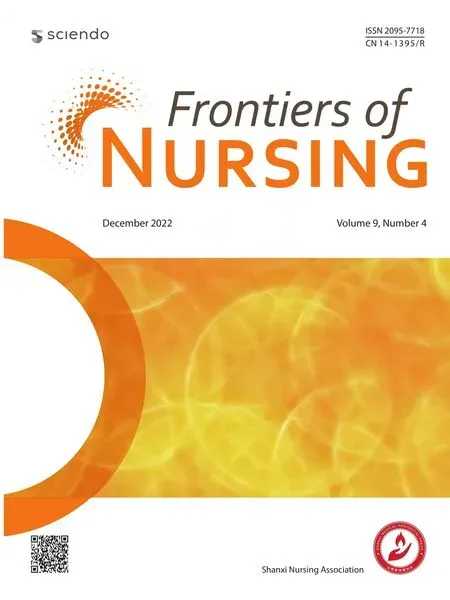Instructors’ caring behaviors, burnout, satisfaction, and academic performance of nursing students in online education and the pandemic era
Ryn Mihel F. Odudo, Mry Kristine Q. Amoy, Ayesh C. Penuel, Ronnell D. Del Ros, Mri Teres M. Fjrdo, Dolly Rose F. Temelo
aCollege of Nursing, West Visayas State University, Iliolo, Iloilo 5000, Philippines
bBataan Peninsula State University, Bataan, Balanga 2100, Philippines
cUniversity of Pangasinan—PHINMA, Dagupan, Pangasinan 2400, Philippines
Abstract: Objective: This study aimed to determine the predictive ability of instructors’ online caring behaviors, online learning burnout, and satisfaction with online learning on nursing students’ academic performance.Methods: This was a cross-sectional study employing the administration of online self-report measures among 606 undergraduate students in one large nursing school in the Philippines. Statistical analysis involved the use of descriptive statistics, Pearson’s r, and linear regression.Results: The mean scores in the instructors’ online caring behaviors scale, online learning burnout scale, online learning satisfaction scale, and self-reported academic performance were 3.88 ± 0.70, 4.00 ± 0.84, 2.51 ± 0.96, and 3.25 ± 0.79 respectively. Satisfaction (β = 0.216, P = 0.000), burnout (β = 0.-098, P = 0.019), and instructors’ caring behaviors (β = 0.096, P = 0.030) explained 11.7% of the variability in the students’ academic performance.Conclusions: Instructors’ caring behavior and levels of burnout and satisfaction are linked to students’ academic success in the virtual learning environment. This study calls for nursing instructors to be mindful of signs of burnout, employ proactive measures that promote satisfactory learning, and foster more caring behaviors in this time of global health crisis.
Keywords: academic performance • academic success • burnout • distance education • nursing education
1. Introduction
The coronavirus disease-19 (COVID-19) pandemic brought the education sector and the world to a standstill. Millions and thousand have been infected and died both globally and locally. Due to the crisis circumstances and to respond to the call for students to continue their schooling, emergency distance or remote learning was adopted as an alternative mode of learning to limit faceto-face classroom instruction and to provide temporary access and support to learning.1,2Online remote learning became the new normal in the education landscape in the time of global crisis.3In nursing education, the COVID-19 pandemic has drastically altered the academic life of nursing students. Inarguably, the shift to the virtual landscape has highlighted the challenges and significant changes brought by the pandemic on individual and collective psychosocial aspects of learning and academic performance of undergraduate nursing students. Various international studies have shown that the closure of learning institutions and the suspension of face-to-face learning have impacted students’ mental well-being and overall academic performance.4–6An academic burnout syndrome has surfaced among higher education students, characterized by emotional exhaustion among a range of other predominantly negative inclinations.7–9
Meanwhile, recent studies found that students consider online learning to be stressful.10,11Learners are generally negative and ambivalent about online education, and that stress was found to have an undesirable impact on online learners’ academic performance and satisfaction.11,12Online learning at the time of the COVID-19 pandemic generated strain and pressure among students requiring them to deal with numerous stressors.13Evidence also shows that stress is a major determinant of burnout.14Moreover, the lack of caring and regular communication between teachers and students may lead to burnout, which can impede academic performance.9
On the positive end of the spectrum, effective teaching approaches that promote good student-teacher relations contribute to resilient practices and outcomes in online learning environments. Particularly, the faculty members’ caring behaviors have been positively associated with facilitating student learning, satisfaction, and motivation to perform well.15Notably, when students perceive the caring behavior of their instructors through a balance between control and flexibility in the online learning environments, the achievement of learning outcomes, intent to graduate, and performance were enhanced.15,16There is also robust evidence that when the nursing faculty exhibited authentic compassion, respect, trust, empathy, and caring language, the students’ academic performance improved significantly.15,17–19Further, integrating the human caring curriculum into education has alleviated stress and improved students’ learning outcomes and performance.20,21
Investigating students’ academic performance is vital as the successful teaching and learning process is assessed by how well students can meet the standards set or by the students’ academic performance.22,23Moreover, to support student nurses effectively during online education and the COVID-19 pandemic, it is essential to look into factors influencing academic performance and tailor interventions to bolster the e-learning infrastructure. In this context, exploring the instructors’ caring behaviors in nursing education can provide meaning to the crucial role of nurse educators during these exigent times. Further, exploring the association of burnout, satisfaction, and instructors’ caring behaviors concerning academic performance may provide a scaffold for the learning environment currently weighed down by the repercussions of COVID-19. Furthermore, studies on the levels of satisfaction, burnout, and instructors’ caring behaviors among student nurses in the COVID-19 online learning environments or emergency remote teaching in the local context remain scarce. This investigation puts into perspective the effectiveness of the current nursing education platform. It may identify gaps and possibly streamline other innovative methods to develop the future landscape of nursing education.
Hence, this study determined whether instructors’ online caring behaviors, online learning burnout, satisfaction with online learning can predict students’ academic performance. Also, this research explored the association between instructors’ caring behaviors, burnout, satisfaction, and academic performance of nursing students in online learning during the era of the COVID-19 pandemic.
2. Methods
2.1. Research design and subjects
This study was a descriptive-correlational, quantitative, cross-sectional study employing the administration of online questionnaires. This study involved undergraduate nursing students in one large private University in the Luzon region of the Philippines. Sample calculation was done using Yamane’s equation (1967).24The required sample size was 307 for a population of 1316 and a 0.05 degree error was expected. To qualify for the study, students had to be: (a) a nursing student, (b) presently enrolled in the University, (c) able to answer the survey online, and (d) willing to participate in the study. The responses of 606 nursing students (n= 606) were included in this study.
2.2. Measures
Three research experts with doctoral degrees in nursing and education evaluated the tools used for this study to ensure the face and content validity and cultural appropriateness of the measures. Details such as age, gender, year level, family income status, location of residence, device and hours spent for online learning, and internet connection stability were collected in the first part of the survey.
Instructors’ Online Caring Behaviors Scale was used to examine the level of instructors’ caring behaviors in online learning. The items were adopted from the Online Caring Behaviors Inventory.25In this study, students were asked to rate 10 items from “1-Never” to “5-Always,” on how often their instructor manifests these caring behaviors in an online learning course. Sample items include “In your online learning course, how often did your instructor treat you kindly as an individual?”. Higher scores indicate higher caring behaviors of nursing instructors. The reliability value of the scale in the current study was 0.93.
Online Learning Burnout Scale assessed general feelings of fatigue, exhaustion, and burnout from prolonged exposure to stress in online learning. Eight items from the Copenhagen Burnout Inventory student version were adapted to match the current context of the study.26Students were asked how often they experience each item on the scale, with responses ranging from “1-Never” to “5-Always”. Sample item include “How often do you feel worn out with online learning?”. Higher scores indicate higher levels of burnout. The scale had a reliability value of 0.93 in the present study.
Online Learning Satisfaction Scale was used to examine online learning satisfaction.27The 7-item scale had 5-point Likert response options (“1-Strongly disagree” to “5-Strongly agree”). Sample items include “I am satisfied with online learning”. Higher scores suggest higher satisfaction levels. Previous research reported that the scale had an internal consistency of 0.90 and a reliability of 0.94 was obtained in the current study.11
Academic Performance was determined following the previous work of nursing scholars.11,28Using a singleitem scale, students were asked to rate their academic performance compared to their classmates. Evidence shows that perceived performance and actual performance are significantly correlated.29The responses were on a scale of “1-Very poor” to “5-Very good”.
2.3. Data collection and ethical considerations
The online questionnaire was administered before the end of the semester in June 2021. Approval to conduct the study was granted by the administration of the university and ethical approval from the Bataan Peninsula State University Research Ethics Committee. Invitation to participate in the survey containing the online questionnaire link (Google Forms) was sent to the student emails and posted in the social media groups where students were exclusive members. A letter asking for informed consent was given to the respondents in the introductory part of the survey. It also contained the purpose of the study and the rights and responsibilities of the respondents. Students were also reminded that participation or non-participation in the research would not affect their course grades. It takes approximately 5–15 min to accomplish the survey. Students were assured of anonymity and confidentiality. The electronic data gathered were password-protected, and access was provided only to the researchers.
2.4. Statistical methods
The IBM SPSS software version 23 was utilized for data analysis of the gathered data. Values for the respondents’ characteristics and levels of instructors’ caring behaviors, burnout, satisfaction, and academic performance were expressed in frequencies, percentages, averages, and standard deviations (SDs). Relationships between variables were tested using Pearson’s correlation. To identify predictors of students’ academic performance, multiple linear regression analysis (step-wise) was performed. The significance level was set at 0.05 alpha.
3. Results
Table 1 shows that the study respondents were 20.08 ± 2.06 years old on average and spend 7.99 ± 3.22 h for online learning. Of the 606 respondents, the majority were female (72.3%), in their second year (40.9%), belonged to the middle-income status (66.2%), residing in the town part of the province (60.7%), utilizes smart or mobile phones for online learning (68.6%), and has a somewhat stable internet connection (76.1%).
Table 2 shows that the mean scores in the instructors’ online caring behaviors scale, online learning burnout scale, and online learning satisfaction scale were 3.88 ± 0.70, 4.00 ± 0.84, and 2.51 ± 0.96, respectively. The mean score of students’ academic performance was 3.25 ± 0.79 out of 5.
Table 3 presents the correlation between variables. Instructors’ online caring behavior had a significant positive correlation with students’ satisfaction (r= 0.144,P< 0.05) and academic performance (r= 0.121,P< 0.05) in online learning. Moreover, student satisfaction had a significant positive correlation (r= 0.321,P< 0.05) with academic performance. Online learning burnout, on the other hand, had a significant negative correlation with satisfaction (r= -0.464,P< 0.05) and academic performance (r= -0.223,P< 0.05) in online learning.
The regression model in Table 4 explaines that 11.7% of the variation in students’ academic performance (F= 26.567,P= 0.001) might be explained by satisfaction (β = 0.216,P= 0.000), burnout (β = 0.-098,P= 0.019), and instructors’ caring behavior (β = 0.096,P= 0.030).
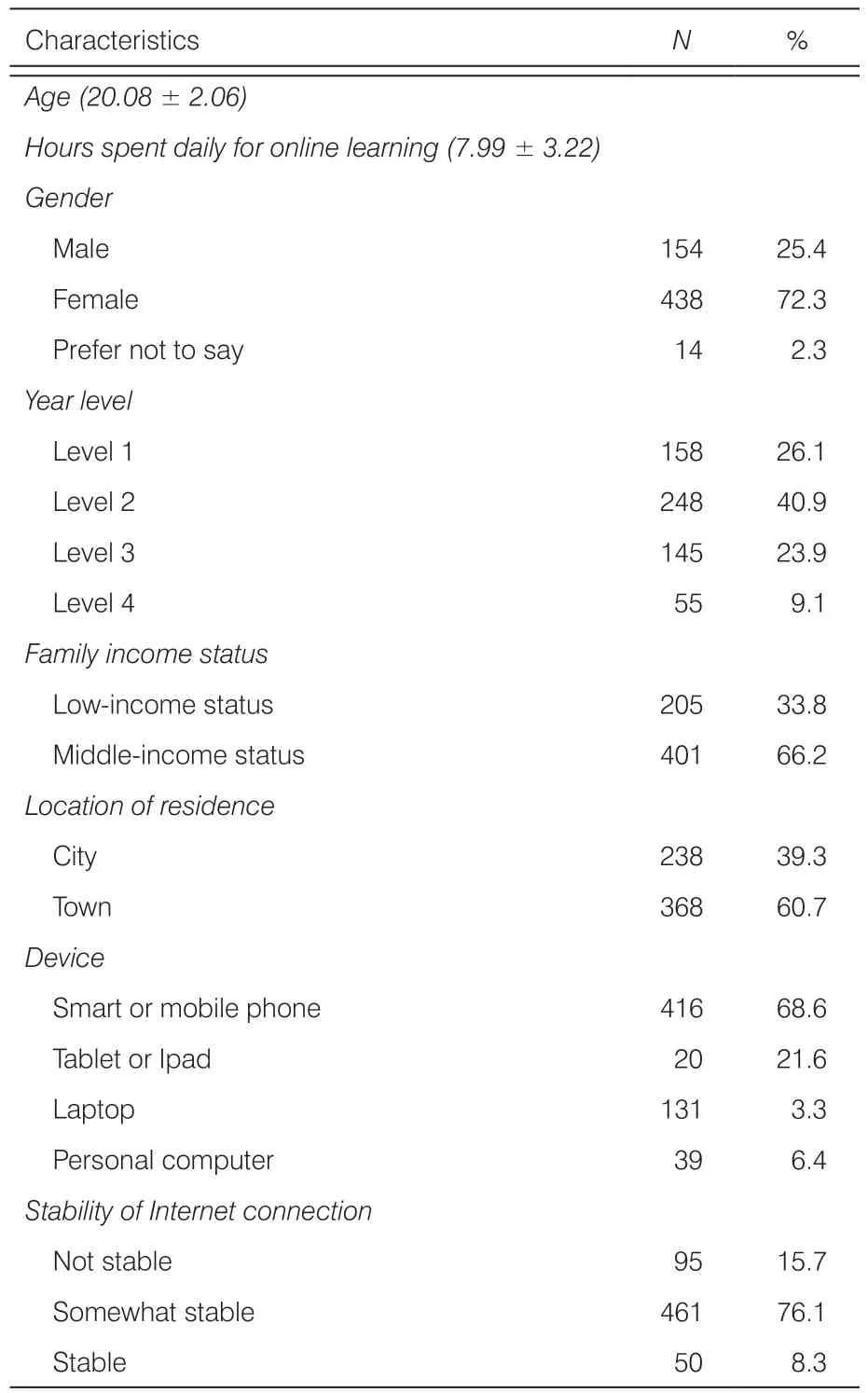
Table 1. Students’ characteristics (n = 606).
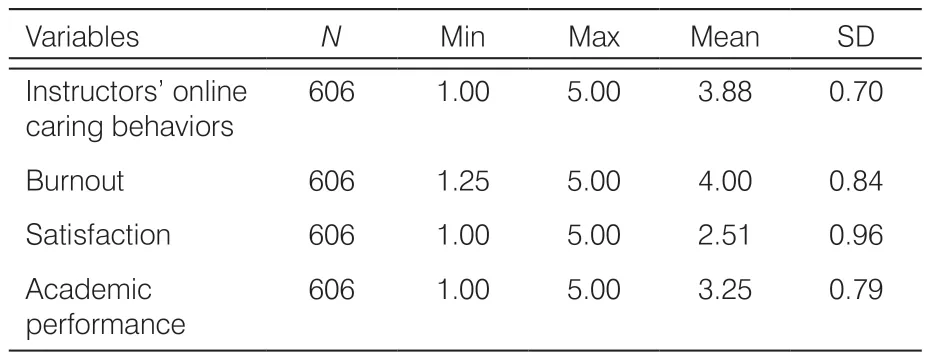
Table 2. Descriptive statistics of the key study variables.
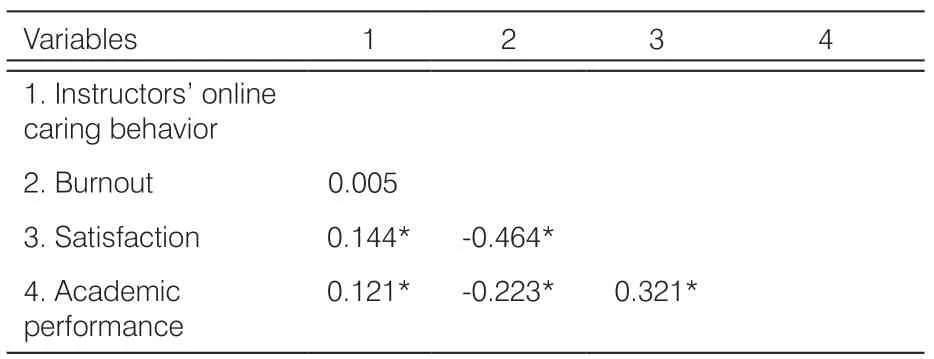
Table 3. Correlation between major variables.
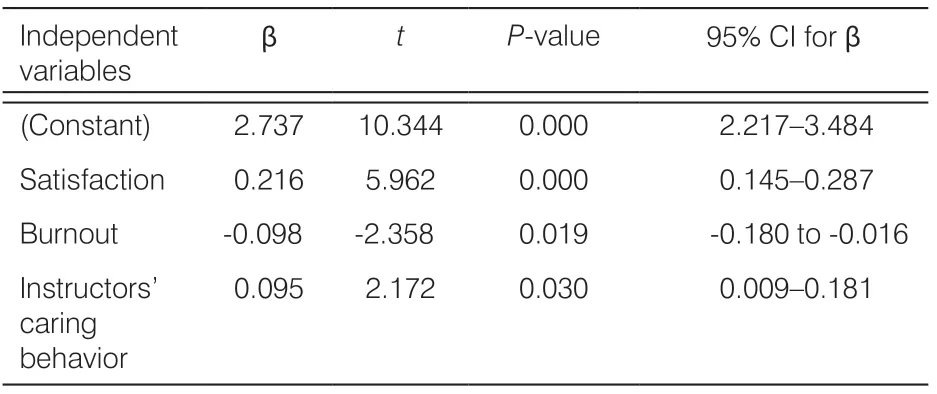
Table 4. Regression analysis of major variables on academic performance.
4. Discussion
This study determined the instructors’ caring behaviors, burnout, satisfaction, and academic performance of nursing students in online learning and the association between variables. It is noteworthy that in this study, students experienced high levels of burnout in the online learning environment. Other studies during the pandemic likewise noted a high prevalence of academic and learning burnout and exhaustion among medical and nursing students.13,30,31Scholars observed that as COVID lingered, nursing students experienced unprecedented levels of poor mental health and higher rates of stress, fear, and anxiety.32–34It may be possible that other mental health issues may exacerbate levels of burnout in the online learning platform along with the presence of the pandemic.
It is also significant to note that students’ satisfaction with online learning was slightly above the midpoint suggesting moderate satisfaction or ambivalence toward online learning. While some reports are revealing that students have well received the use of online learning during the pandemic,35,36some other studies particularly among medical and nursing students disclosed dissatisfaction with virtual education.11,37,38Dissatisfaction of students was attributed to higher workload, technical and internet issues, and ineffectiveness of the online modality to cater to the practical aspects of the course.11,37,38Correspondingly, our study demonstrated that burnout was negatively associated with students’ satisfaction with online learning. Prior scholars noted that academic burnout was related to negative consequences in schooling and satisfaction with studies.39,40The high levels of burnout and the less-than-optimum satisfaction of students with online learning may be attributed to the fact that the current alternative mode of instruction during the pandemic was not deliberately planned and was only intended to be an emergency and temporary measure to access learning and continue schooling due to the crisis circumstances.1,2Our results suggest that nursing colleges should undertake steps to address the relatively high levels of burnout and learning dissatisfaction of students in times of emergency remote learning. Nurse educators may need to revisit current teaching approaches, plan deliberately succeeding teaching and learning strategies, and start initiating innovative measures that foster positive learning experiences to potentially reduce the burden and exhaustion of students in the online platform.
Notably, we found that the instructors’ online caring behavior was positively related to students’ satisfaction. Also, this study found that higher levels of instructors’ caring behaviors and satisfaction with online leading result in higher levels of academic performance. Our result indicates that the higher the satisfaction felt by students, the greater the likelihood that students’ academic performance will increase. Our result corroborates the findings of other studies conducted within the context of online learning and the pandemic among nursing students and other disciplines.11,41,42Moreover, higher academic performance is linked with students perceiving their instructors as caring. Instructors’ quality was considered the most important factor that influences the satisfaction of students during online classes.42It is crucial for nursing faculty members to convey and create a sense of caring presence in the online classroom to support teaching practices as well as students’ learning satisfaction and academic success.25,43,44Also, nursing schools may consider strategies that can promote satisfaction with the teaching and learning process to support students’ achievement and progress in the nursing program.
Finally, we found in this study that higher levels of burnout in online learning predicted poor academic performance. Our finding is consistent with the metaanalysis reporting student burnout resulting in worse academic achievement.45A similar finding was noted in a systematic review involving studies conducted before the pandemic among nursing students.46Efforts should be made to help students cope with their studies, and steps should be undertaken to lessen the negative impact of burnout on students’ performance in nursing schools employing online learning modalities.
The single-site sample, online data collection method, and cross-sectional research design may limit the generalization of the findings of this study. The use of self-reports makes the result of the investigation vulnerable to response bias. Also, although the measures used in this study passed appropriate psychometric stages (validation and reliability test), future studies are expected to use more robust statistical tools to evaluate the scale’s psychometric properties. Further research may be done to validate and replicate the study under different conditions or when the pandemic is over. Even so, our study extends research on students’ online learning experience in the pandemic era.
5. Conclusions
It is highlighted in this study that nursing students experience high levels of burnout in the online learning platform during the pandemic which negatively impacts students’ academic performance and satisfaction. Moreover, nursing instructors’ online caring behaviors and students’ satisfaction levels with online learning modality contribute significantly to their academic success in the virtual learning environment. This study suggests that academic institutions of nursing should make efforts to recalibrate current strategies employed in online learning to mitigate the high levels and negative impact of burnout on students. Nursing instructors are encouraged to be mindful of signs of burnout among students, employ innovative strategies and proactive interventions that promote satisfaction in the online learning environment and foster more caring behaviors in this time of global health crisis. Streamlining these variables and measures is necessary to develop a successful teaching and learning landscape in online education in the nursing education context.
Acknowledgment
The authors would like to thank all participants of this study. This research did not receive any specific grant from funding agencies from the public, commercial, or non-profit sectors.
Ethical approval
This study was approved by the Research Ethics Committee of the Bataan Peninsula State University.
Conflict of interest
All contributing authors declare no conflicts of interest.
- Frontiers of Nursing的其它文章
- Frontiers of Nursing Call for Papers
- Perioperative nursing of a newborn with Beckwith-Wiedemann syndrome
- Combination of diaphragmatic breathing with therapeutic walking exercise to increase peak expiratory flow rate in asthma patients
- Comparison of research hotspots and trends in long-term care for the elderly between China and Australia: a bibliometric analysis†
- Knowledge of reproductive health rights and its associated factors among Wolkite University undergraduate students, Wolkite, southern Ethiopia
- Experiences of Chinese nurses studying for master’s degree in the UK: a qualitative study†

